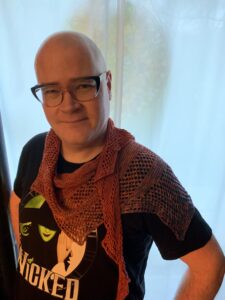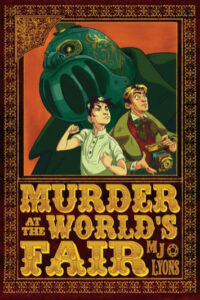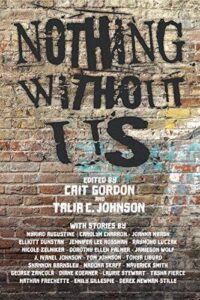Writing and publishing during a pandemic has been challenging to say the least. Small presses are closing. Conferences are going online. And yet, opportunities still exist.
So, we’re excited to both introduce SF Canada’s newest member, Derek Newman-Stille, and to share their latest interview. In the Q&A below, Derek talks with Renaissance publisher Nathan Caro Fréchette to explore the origin and development of a small press.
Keep reading for a fascinating and very personal perspective on creating and promoting work by and for marginalized authors. Including Nothing Without Us, an anthology co-edited by Talia C. Johnson and SF Canada member Cait Gordon.
You may recognize Derek as the author of the Aurora-winning blog Speculating Canada, as well as numerous short stories and anthologies. Both Derek and Nathan’s bios are included at the bottom of the interview.
Interview with Nathan Caro Fréchette About Small Presses and Canadian SF Publishing
By Derek Newman-Stille
Derek: Welcome to another interview Nathan. I am looking forward to catching up and seeing how you are coping with the COVID world. To start our interview, could you tell us a little bit about yourself?
Nathan: Sure! I’m a queer, transgender dad, and I’m also an artist, a writer, a publisher and one of the people in charge at Renaissance Press.
Derek: I’m glad that you mentioned Renaissance Press. I was wondering if you could share a little bit about how Renaissance Press started?
Nathan: Absolutely! So what seems like another lifetime ago, I used to teach creative writing. I did this for a few years, and a couple of my former students and I formed a critique circle when I stopped teaching. A year or two into this critique group, two of our members got publishing contracts – one with a really big publisher. They brought the contracts for me to look over, and they were terrible contracts: the publishers wanted things like lifetime of copyright without any possibility of reverting the rights back, wanted print and audio rights even though they explicitly only wanted to publish an ebook version, things like that. The contracts were so terrible that I had to recommend they pass on the opportunity, which broke their hearts – and mine.
I ranted to a friend about this, saying I didn’t understand why publishers weren’t friendlier to their authors, because I saw it as a partnership, and my friend just looked at me and said, “Why don’t you start your own company?”
So with the help of a few friends, I did.
Derek: Wow! That must have been tough to see. And I have to say, terrible contracts seem to be pretty regular in the publishing industry. I’m so glad that you created a press that would better represent authors and support them.
Nathan: Thanks! It was really the primary goals of Renaissance – we wanted a place where authors would be truly supported and understood, and be able to have some creative control even though they would be traditionally published.
Derek: Small publishers play and important role in Canadian SF publishing. What do you feel are some of the benefits of being a small publisher, especially in the Canadian SF market?
Nathan: One of the benefits is definitely the very personal relationship we have with our authors. We can have honest discussions about what they want, and because there aren’t a whole huge team working on the book, every step can be personalized to reflect what the authors really want. I wouldn’t want to give up that close relationship for the world; there’s just something magical about being the person who gets to be there when they see their cover for the first time and see their reaction when you’ve done it just right.
As for other advantages, it allows us to publish more hybrid titles, or titles that don’t fit neatly in one genre, because we don’t have a huge catalog of titles to market, we can really focus on each book’s possibilities instead of only worrying about which book shelf it’s going to be on, if that makes sense.
Derek: That personal touch is so important!!
What are some of the hybrid titles that Renaissance has published?
Nathan: For example, one of our most recent titles, Murder At The World’s Fair, is a young adult steampunk murder mystery set in an alternate past. Or, one of our upcoming titles, Cypher, is a sci-fi mystery, and because of its preoccupation with puzzles, the book itself is filled with actual puzzles to solve, so it’s a book, but also kind of a game.
Our anthologies also tend not to be limited in genre, but are multi-genre, such as Nothing Without Us, which is centred on positive disability representation, but has everything to humour, to hard sci-fi, to slice of life.
Derek: I really like that space for writing innovation and imagining new possibilities.
Nothing Without Us actually brings me to my next question. Originally Renaissance Press billed itself as a small Ottawa publisher, but a few years ago the press changed to highlight the fact that you publish marginalized authors. What inspired the change in focus or perhaps change in how the press was represented?
Nathan: Well, after a few years of publishing books, we sat down and tried to narrow down our editorial policy so that we could make more informed decisions about what we published. So far, the only criteria was books we fell in love with, but we started falling in love with too many of our submissions to publish them all. So we took an actual look at what really drew us in most of the time, and what really made us excited to publish a book, and we realized we were naturally drawn to stories that were by and about marginalized people, which at that point had mostly been disabled and LGBTQIA2P+ people. We were also noticing that a lot of the complaints from authors around us included the fact that there was a lot of gatekeeping in the publishing industry preventing marginalized authors from publishing, and since Renaissance was made to elevate the voices of those who were often left behind by the industry, it seemed like a natural conclusion that we would focus on marginalized authors.
Derek: Often the larger presses tend to be more conservative and are reluctant to adopt books about marginalized people that are written by marginalized people. Do you feel like small presses have a stronger ability to do this and how so?
Nathan: I’m not sure I would say a stronger ability, because the truth is these are choices that we make as a business and any business can make that choice. But I think that being a smaller business perhaps helps us do it right, because the close personal relationships we can have with our authors helps us understand their goals a bit better, and the fact that we try to cultivate a close relationship with our audience helps us find the right public for the book, I think, because we market each book differently.
Derek: Well said. I think that close personal relationship is essential for supporting marginalized authors, particularly from groups that are often silenced.
Are there some examples of that personal touch that you are comfortable sharing?
Nathan: Well, I don’t want to get too much in the details because it can get quite personal, but for example I’ve had authors who have felt comfortable enough to come to me with questions and speculations about their gender and sexual orientation, about their mental health, and a lot of other things, and I think I can safely say I’ve developed a lot of close friendships with my authors. On top of that, I know of a few who have ended up finding support and a community in their audiences, as well as other Renaissance authors. Our author community is very tightly knit, and I think each Renaissance author has made friends and grown not only their audiences but their communities by publishing books with us.
Derek: What does it mean to you, as a marginalized person yourself, to be able to provide this space for other marginalized people? What is it like to elevate voices and do social justice work while also entertaining people with great books?
Nathan: It means more than I have the ability to say. It’s so special to me to be able to transform these incredible stories into beautiful books that the authors will be proud to hold, but also to be able to place them in front of readers, and top off all that joy with actual money for the authors. There are few things that thrill me more than seeing a picture of a happy author holding their new book for the first time, or sending nice royalty payments when a book is doing really well.
Derek: You and I are both Queer and Disabled, so this may seem like a question with an obvious answer to both of us, but, why do you feel it is so important that we have marginalized representation, especially in Canadian SF?
Nathan: So often, our stories are told by people who’ve never even met a person like us. It’s not just a question of it being annoying or disappointing: it can be downright dangerous for us to be misrepresented. Mentally ill people like myself are often depicted as serial killers; it’s actually hard to find a depiction of someone like me in fiction that ISN’T a serial killer. This makes people afraid of me, and I’m much more likely to be harmed because of that fear because people might attack me thinking they are defending themselves. The same can be said of transgender people, people of colour, and most marginalized communities. A lot of hate crimes stem from fear, and that fear is often born from and stoked by misrepresentation in fiction.
Derek: I often feel like marginalized people have a unique ability to write speculative fiction, especially since so many of us are already alienated from the very straight, cis, ableist, racist society that surrounds us. Do you feel like we have insights that we can provide to society through our marginalization?
Nathan: Absolutely. As marginalized people, we tend to come up against huge and frequent barriers in everyday life that prevent us from doing a lot of things, or even existing in some spaces. Because of that, we tend to spend a lot of time thinking about solutions and possibilities that people who have fewer or no barriers would never think about, because those possibilities aren’t missing for them. So I think we have a natural ability to imagine worlds where these barriers are removed or worked around in original fashions.
Derek: I’ve been thinking a lot about COVID and its relationship to disability, especially since so many people are still saying “it’s ONLY disabled people who are dying from COVID” as though our lives matter less than others, and I can’t help but think about Renaissance Press’ book Nothing Without Us by Cait Gordon and Talia Johnson. It seems like a well-timed book to elevate disabled voices at a time when the mistreatment of disabled people is so visible in our world. What are your thoughts about COVID and Nothing Without Us? And especially about the need for disability representation?
Nathan: I think that good representation matters now more than ever. I’ve heard it so much, this “It’s only disabled people” and “It’s only old people” as if our lives were somehow disposable. People don’t think of us as people, because they are used to seeing us used as mere tropes with two-dimensional characters in fiction, which is where a lot of people are exposed to folks who might be different than themselves. I often wonder, if stories like the ones in Nothing Without Us were more commonplace, if most people would still see us as disposable or not human enough to be worthy of living.
Derek: Very well said!! Disability representation is so incredibly important!!As a way of creating community while we were all social isolating during COVID, you and Renaissance Press decided to hold a virtual convention. What inspired the convention and why are online conventions like this so important during COVID, but also in general for public access (especially accessibility for disabled folks)?
Nathan: The one comment we got the most often from our audience was “Thank you for doing this, I can never come/stay as long as I want to these conventions usually.” So many people were able to attend and stay longer just because it was online, and they didn’t have to spend spoons dressing, commuting, hire help or sit in uncomfortable (which can translate as painful for some disabled people) chairs in cold rooms with loud ventilation that prevented them from hearing, etc. We made this convention because of COVID, but it will be something we will continue to have for sure, just because so many people were thankful for the accessibility. And we are having our next edition of it this October, in partnership with SF Canada!
Derek: That is incredibly exciting. In addition to all of the horrors caused by COVID, it seems to have opened up some new opportunities for re-thinking things.
Nathan: Yes! I hope future events might take the opportunity to do hybrid events which are partly online partly not in the future
Derek: How do you see COVID changing small presses in Canada?
Nathan: There have definitely been challenges, that’s for sure. But one thing that’s been easier is organizing things with authors who live really far. We have an author in Vancouver, for example, and organizing launches was going to be difficult because we were looking at long travel times, but now with online events it makes everything smoother and easier to organize. I think it’s going to make us closer as a community of authors and presses.
Derek: That is fantastic!! I love the way that these new changes are bringing people together in unique and exciting ways!
Where do you see Renaissance Press going from here? What are some of the next steps for the press?
Nathan: We have our next big event in October, and after that, we will be having more online events twice a year. We have wonderful, amazing books that are coming out later this year which I’m very excited about, and in fact, our publishing calendar is full all the way to 2022, so we have lots of exciting things coming!
Derek: How about your own writing – are there any exciting new projects coming up?
Nathan: Well I have a book of queer fairy tale retellings coming out soon with an fellow author. We’re illustrating the book, and it’s going to be absolutely gorgeous. Other than that, I’ve been working on a graphic memoir of my transition and my relationship with my partner.
Derek: Your memoir sounds fascinating!! Can you tell us a little bit about it?
Nathan: Absolutely! So it talks about all the times in my life where I thought I might be transgender, starting from when I was five years old. It’s told in small vignettes, and it incorporates all of my 16-year relationship with my partner, since her own transition was hugely impactful on my transition.
Derek: That is incredibly powerful!! I look forward to reading it.
As we wrap up our interview, is there anything further you would like to mention or anything I missed talking about with you?
Nathan: I think that’s all I wanted to say!
Derek: Thank you Nathan. I really appreciate you taking the time to talk to me and share your insights.
Nathan Caro Fréchette is a queer transgender sequential artist, publisher, and author. He has published over a dozen short stories, both graphic and prose, as well as five novels, three graphic novels, and two works of nonfiction. He has taught creative writing over a decade, and has a degree in Film Studies and another in Sequential Art. He was the founder and director of the French Canadian literary magazine Histoires à Boire Debout, an editor for the French Canadian graphic novel publisher Premières Lignes, and is a co-founder of the Ottawa-based publisher Renaissance.
Derek Newman-Stille, MA, PhD ABD (They/Them) is a Disabled, Queer, Nonbinary activist, author, artist, academic, and editor. They edited the anthologies Over the Rainbow: Folk and Fairy Tales from the Margins (Exile) and We Shall Be Monsters (Renaissance Press) and are the 8 time Prix Aurora Award-winning creator of the digital humanities hub Speculating Canada. Derek has published in fora such as Uncanny Magazine, The Playground of Lost Toys, Quill & Quire, Fireside Magazine, Diamond Book Shelf, The Town Crier, Exile Quarterly, and Nothing Without Us. Derek’s art work has been published in fora such as Feminist Space Camp, Lackington’s, Postscripts to Darkness, and Aging Activisms.








